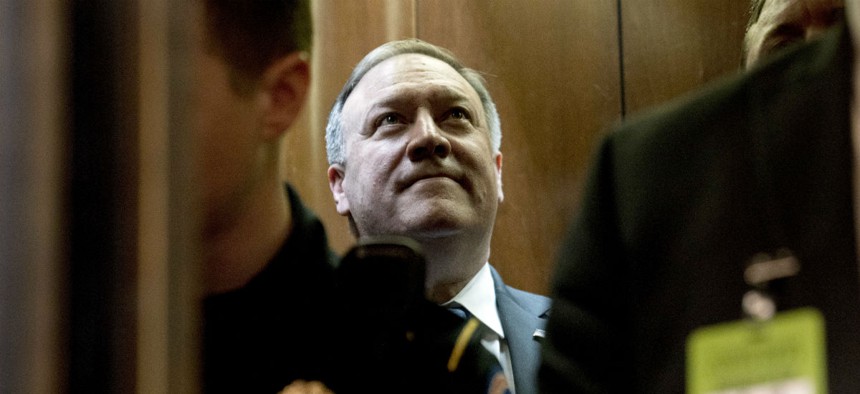If Confirmed, Pompeo Would Inherit a State Department in a State of Despair
Senators prompt Trump’s nominee on how he would address problems at the “emaciated” department.
Amidst the policy discussions of such grave issues as the North Korea threat, the Iran nuclear accord and the U.S. use of torture, Thursday’s confirmation hearing for Secretary of State nominee Mike Pompeo devoted significant attention to management challenges at Foggy Bottom.
When pressed about the State Department’s high vacancy rate, exodus of experienced talent and low morale, Pompeo, the current CIA director and a former House member, appeared eager to ease some of the workforce pain. But he would arrive to find enormous challenges.
Sen. Johnny Isakson, R-Ga., chairman of the Foreign Relations Subcommittee on State Department and USAID Management, praised Pompeo for his leadership at CIA, and challenged him to similarly address State’s sinking morale if he is confirmed.
“The attitudes at the CIA are the best they’ve probably ever been,” Isakson said. “So, I want to challenge you to replicate, where possible in the State Department, that same energy and fire you have at the CIA, because the State Department needs it desperately.”
Pompeo, who at CIA sought to break down centralized “bureaucratic vines” that could impede rapid, localized decision making, replied with praise for career diplomats. “I know the Foreign Service officers have that same esprit, that same desire for mission, that same desire to be relevant and important. If you decide to be a Foreign Service officer . . . to devote your life to that, you have a special commitment, and my task, if confirmed, will be to free them up to go do the great work that they signed up to do when they came aboard at the State Department.”
But the committee’s ranking member, Sen. Robert Menendez, D-N.J., sounded skeptical. He blasted President Trump for creating an “emaciated” department: “When the president and those closest to him balk at the very idea of diplomacy, and instead advocate unnecessary wars that will cost the blood of our children and the treasure of our coffers, will you go along with them?” he asked. Or, as our nation’s top diplomat, will you champion diplomacy and offer actual plans? Will you stand up to President Trump and advise him differently when he is wrong? Or will you be a yes man?”
Pompeo declined to address hypotheticals but stressed his plan to be a “talent hawk” for “building a team” and find “the best fit” for vacant jobs, including 37 ambassadorships. He would start with identifying “the biggest gaps” and “encourage, command and cajole” to recruit Foreign Service officers and civil servants, as well as qualified outsiders for all of State’s functions, including diplomacy, humanitarian assistance and development.
Pompeo would face a tremendous challenge. An analysis by Government Executive in February found that the department lost 12 percent of its foreign affairs specialists during President Trump’s first eight months in office. Overall, State’s civilian workforce shrank more than 6 percent over that period.
In the run-up to Pompeo’s confirmation hearing, the nonprofit Partnership for Public Service compiled numbers showing that under departed Secretary Rex Tillerson, State received the lowest employee engagement score it’s ever received in the partnership’s “Best Places to Work in the Federal Government” rankings. This represents a 2.8-point decline from 2016 and the first time that the department has not been ranked in the top five large agencies since 2011, the group said.
Through a combination of White House inaction and Senate confirmation politics, the pace of appointments is at a record low. Of the 161 key, Senate-confirmed political appointments at State, 61 positions still have no nominee, four are awaiting a formal nomination to the Senate and 27 positions are awaiting Senate confirmation, as of early April, the partnership said.
Also awaiting the next secretary are decisions on whether to continue, modify or abandon Tillerson’s touted reorganization plan, which appeared to lose steam in Tillerson’s final days as Congress declined to implement related budget cuts. Earlier this month, internal documents obtained by Politico showed that Tillerson had spent $12 million on as many as 90 outside consultants to help with his intended efficiency-creating “redesign.” A Senate Foreign Relations Committee hearing on the reorganization scheduled for March 15 was canceled.
Within State’s bureaus, critics remain wary of the Trump administration’s perceived disregard for career expertise. The ranking member of the House Oversight and Government Reform Committee, Rep. Elijah Cummings, D-Md., in March joined with Foreign Affairs Committee top Democrat Eliot Engel of New York, in writing the White House demanding documents on efforts alleged by a whistleblower portraying Trump conservative activists as “targeting” career civil servants perceived as disloyal to Trump. Pompeo might also have to address a reported effort by the White House to centralize the approval of promotions at the State Department.
If confirmed, Pompeo could rely on the newly re-designated Deputy Undersecretary for Management Bill Todd for personnel issues.
Pompeo’s confirmation is by no means assured, as the Foreign Relations Committee and the full Senate are nearly evenly divided between the parties, and Sen. Rand Paul, R-Ky., has already come out against Pompeo, citing his perceived saber-rattling and past support for “enhanced interrogation techniques” by U.S. operative against suspected terrorists.
Panel Chairman Bob Corker, R-Tenn., an enthusiastic supporter of Pompeo, said he is hoping for a vote the week of April 23.




